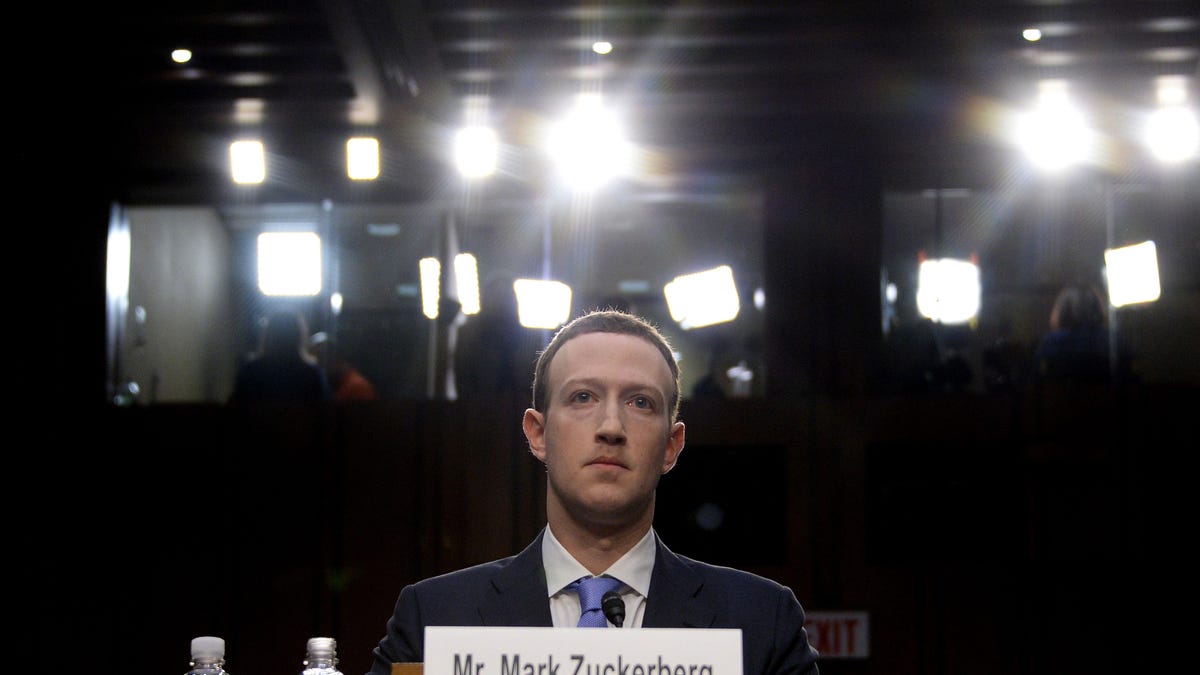Zuckerberg calls on his team as go-to answer in hearings
In his testimony before Congress on Tuesday and Wednesday, Facebook CEO Mark Zuckerberg says numerous times that he'd have to defer to his staff.

Facebook CEO Mark Zuckerberg testifies Tuesday before a joint hearing of the US Senate's commerce and judiciary committees.
Facebook CEO Mark Zuckerberg doesn't have all the answers lawmakers are looking for.
On day one of his testimony before Congress, Zuckerberg seemed to frustrate some senators when he said that he didn't know the answer to some questions, or that he'd have to check with his team.
During the more than five hours of testimony Tuesday before the Senate Judiciary and Commerce Committees, he gave one of those two answers at least 18 times. In the five hours of testimony on Wednesday to the House Energy and Commerce Committee, he told lawmakers he'd have to get back to them at least 19 times.
For instance, in an exchange Tuesday with Sen. Roy Blunt, a Republican from Missouri, Zuckerberg was asked if Facebook tracked devices that have the social network's app downloaded onto them, but are not using Facebook. The CEO said that he didn't know and that he'd have to check with his team. Blunt seemed annoyed that the CEO punted -- "Really?" he asked -- and said this seemed like a basic question.
Zuckerberg's in Washington to discuss online privacy and data protection and to apologize for the company's missteps. Facebook has been engulfed in controversy since it was made public that Cambridge Analytica, a political consultancy with ties to the Trump presidential campaign, harvested data on up to 87 million Facebook users without their permission.
With more than 2 billion users monthly, Facebook is the world's largest social network and one of the most influential technology platforms in the world. It's been trying to grapple with its scale and influence, along with the negative consequences that come with it.
Both Zuckerberg and Facebook COO Sheryl Sandberg have admitted they were unprepared for the level of attacks and manipulation that bad actors would use on their platforms. The controversy has raised questions over Facebook's handling of our personal information -- and whether the social network can be trusted to protect all that data. Remember, Facebook is an ad-supported site, which means it makes its money off users' data.
During Tuesday's hearing, Sen. Ted Cruz, a Republican from Texas, pressed Zuckerberg on whether he considers Facebook to be a "neutral public forum" or a platform exercising its First Amendment rights for free speech.
"There are a great many Americans who I think are deeply concerned that Facebook and other tech companies are [engaging in] a pervasive pattern of bias and political censorship," Cruz said.
Zuckerberg said the company promotes the exchange of ideas but stopped short of calling it a neutral public forum. He said he's unfamiliar with the specific legal definitions and that he'd "need to follow up" with the senator.
The exchange got heated as Cruz pointed out several right-leaning and religious groups that have had their Facebook pages and posts deleted. He asked if Zuckerberg was aware of whether any posts from left-leaning organizations -- he gave the example of Planned Parenthood and MoveOn.org -- have been deleted. Zuckerberg said he's not aware.
During the hearing before the House committee, Zuckerberg told Rep. Marsha Blackburn, a Republican from Tennessee, that he's unfamiliar with legislation she introduced last year called the "Browser Act."
This legislation is meant to "harmonize" privacy regulations for so-called edge providers or internet companies like Facebook and broadband providers. It was introduced after Congress struck down regulation from the FCC that would have forced broadband providers to require opt-in options to consumers to share their data with third party advertisers. Zuckerberg said he's unfamiliar with the legislation, but said he'd get back to her regarding Facebook's view of the bill.
"It's only 13 pages," Blackburn quipped. "You can easily become familiar with it."
He then got into a testy exchange with Rep. Diana DeGette, a Democrat from Colorado. DeGette asked Zuckerberg about two lawsuits in which Facebook was accused of being lax with privacy, including the class action Lane v. Facebook. The company settled the case in 2009 by creating a $9.5 million fund. In that case, Facebook was accused of sharing its users' information without consent through its Beacon program, which shared information about users' information on third-party partner sites in Facebook news feeds.
DeGette quickly moved on to another question, asking him if he's aware of the 2011 consent decree from the Federal Trade Commission, in which the agency found Facebook had deceived consumers by telling them they could keep their information on Facebook private, and then repeatedly allowing it to be shared and made public. He said he's aware of the consent decree. But when she asked if he knew whether the company paid a financial penalty, he said he didn't know.
"You don't remember if you had a financial penalty?" she asked. "You'd think a financial penalty would be extremely important. You are the CEO, right?"
He also told Rep. Ben Lujan a Democrat from New Mexico that he was unfamiliar with the term "shadow profile," which is used to describe the data that Facebook collects about people who do not have Facebook accounts.
Lujan pressed Zuckerberg further.
"Do you know how many points of data Facebook has on the average non-Facebook user," he asked.
"Congressman, I do not off the top of my head," Zuckerberg replied. "But I can have our team get back to you afterwards."
First published April 10 at 1:13 p.m. PT.
Update on April 11 at 12:56 p.m. PT: Adds information from Wednesday's House hearing.
Cambridge Analytica: Everything you need to know about Facebook's data mining scandal.
The Smartest Stuff: Innovators are thinking up new ways to make you, and the things around you, smarter.

